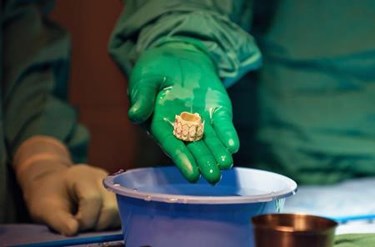Edwards CEO Confident In Continued TAVR Market Leadership
By Jof Enriquez,
Follow me on Twitter @jofenriq

Edwards Lifesciences Corporation exceeded analysts' expectations for third quarter earnings on strong demand for its transcatheter aortic valve replacement (TAVR) devices as more patients adopt the minimally invasive alternative to traditional open heart surgery in treating aortic stenosis.
"Adoption of our SAPIEN 3 transcatheter valve system continued to propel our growth, which exceeded our expectations. We remain optimistic that transcatheter valve procedure adoption is still at its early stages. And the growing body of compelling clinical outcomes gives us confidence that, with expanded evidence, larger populations of patients suffering from aortic stenosis will be eligible for TAVR," Mike Mussallem, chairman and CEO, Edwards, told analysts in an earnings call, according to a transcript provided by The Street.
Transcatheter heart valves (THV) sales rose 10.8 percent to $296.1 million, primarily driven by continuing strong procedure growth in all major geographies and continuing SAPIEN 3 launch in the United States, according to Zacks. Edwards upgraded its full year 2015 earnings guidance, with adjusted earnings per share in the range of $4.43–$4.53 and total sales of $2.3–$2.5 billion.
THV sales in the U.S. surged 33.1 percent, while THV non-U.S. sales climbed 25.1 percent, on increased adoption in Europe and ongoing product launch in Japan. Europe, in particular, drove up THV international sales. Both overall therapy adoption and sales there increased roughly 20 percent in the third quarter, buoyed by growing therapy awareness, rising patient referrals for TAVR, and positive clinical experience.
"The transcatheter valve market is developing quite a bit faster than anybody was expecting," Jefferies analyst Raj Denhoy, told Reuters.
TAVR is suitable for patients who are poor candidates for traditional open heart surgery. But even those who are eligible for surgery are now opting for a TAVR procedure because it is minimally invasive, carries less risk, and offers a faster recovery time. TAVR uses a catheter threaded into the femoral arteries to wedge a replacement valve into the old valve's place. Similar to how a stent props open a constricted artery, the new valve pushes the old valve leaflets aside to re-establish blood flow.
In June, Edwards' SAPIEN 3 TAVR device was cleared by the U.S. Food and Drug Administration (FDA) for the treatment of high-risk patients suffering from severe, symptomatic aortic stenosis. The company is now working to gain approval by 2016 for an expanded indication to include intermediate risk patients.
"Expanding the indication to treat intermediate risk patients remains a key focus. We expect the data on both SAPIEN XT versus surgery, as well as SAPIEN 3 intermediate risk cohorts, to be presented at American College of Cardiology (ACC) in 2016. Assuming a positive trial and an expedited FDA review, we plan for a late 2016 U.S. approval with minimal contribution to sales next year. We expect our Continued Access program for intermediate risk patients in the U.S. to continue until commercial approval," Mussallem said of the company's plans in the coming year, according to the call transcript.
"We think that we're only treating the oldest and sickest patients today. And with the marvelous results that we've seen clinicians get with transcatheter valves so far, we really believe that the aortics are a big opportunity in the future," Mussallem added. "We are confident in our continued leadership in TAVR, even as competition increases."
Edwards is trying to replicate its TAVR success in the transcatheter mitral valve implantation (TMVI) space, an effort aided by its acquisition of CardiAQ Valve Technologies for $350 million in July. However, Mussellman said during the call that it is still early to talk about TMVI sales, pending additional clinical studies. In contrast, TAVR represents "a lower risk, more certain long-term opportunity," given that the pool of patients undergoing TAVR procedures is expanding.
In the call, Edwards announced that it is also preparing the launch of its other heart valve systems, INTUITY Elite (2016), and CENTERA (2017). The company also announced upcoming clinical trials for the Forma transcatheter Tricuspid Repair System and Magna Valve.
